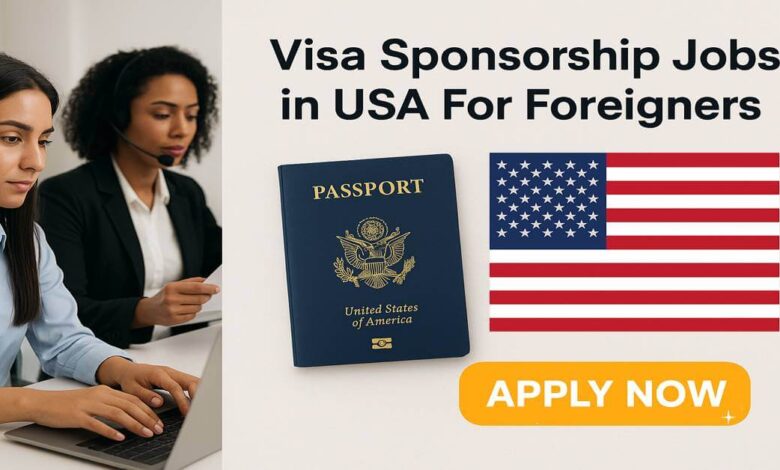Visa Sponsorship Jobs in USA For Foreigners 2026

Dreaming of working in the USA? Good news salaries are competitive, ranging from $30000–$45000 annually for entry-level and unskilled jobs, while skilled roles like IT, healthcare, and engineering often pay $70000–$120000 or more.
Many opportunities are available both onsite (construction, hospitality, healthcare) and remote (digital marketing, IT, content writing). Whether you’re just starting out or have years of professional experience, there are options for you from hands-on seasonal work in agriculture to high-paying tech jobs with global companies.
Unskilled Jobs with Sponsorship:
Unskilled jobs don’t require advanced degrees, but sponsorship is much harder to obtain in these roles. Most opportunities come through temporary visas, such as the H-2A (agricultural) and H-2B (non-agricultural seasonal work). Common jobs include:
- Agricultural work: fruit and vegetable harvesting.
- Hospitality: hotel housekeeping, cleaners, and kitchen staff.
- Food service: fast food crew, restaurant helpers.
- Construction: general labor roles.
- Janitorial services: cleaners and maintenance staff.
These jobs are usually seasonal or temporary. For long-term sponsorship, skilled professions have a higher chance of approval.
High-Paying Jobs:
High-paying jobs in the USA are found across industries like technology, healthcare, finance, and law. Careers such as software engineers, doctors, financial analysts, and legal professionals often top the salary charts. These roles usually require advanced education, experience, and specialized skills, but they also offer excellent career growth and stability.
Entry-Level Jobs:
Entry-level jobs in the USA give fresh graduates and newcomers a chance to start their careers. Common roles include customer service representatives, administrative assistants, junior developers, and sales associates. These positions help individuals build experience, develop skills, and grow into higher-paying roles over time.
Remote Jobs:
Remote jobs in the USA are becoming increasingly popular, offering flexibility and work-life balance. Roles range from customer support and content writing to software development and digital marketing. Employers seek self-motivated individuals with good communication and technical skills to thrive in virtual environments.
IT Jobs:
IT jobs in the USA are in high demand, covering positions like software developers, cybersecurity analysts, network engineers, and cloud specialists. Candidates with expertise in programming, system management, and emerging technologies can expect competitive salaries and career advancement opportunities.
Healthcare Jobs:
Healthcare jobs in the USA include doctors, nurses, medical technicians, and healthcare assistants. With a growing demand for skilled professionals, this sector offers stable employment and competitive benefits. Many positions also provide opportunities for specialization and long-term career growth.
Engineering Jobs:
Engineering jobs in the USA span multiple fields such as civil, mechanical, electrical, and software engineering. Engineers are needed for infrastructure projects, technology development, and industrial innovation. These roles are ideal for problem-solvers with technical expertise and offer rewarding salaries and advancement prospects.
U.S. Companies for Visa:
Each year, the U.S. Department of Labor releases data on the top employers sponsoring work visas. Some of the most consistent sponsors include:
- Amazon
- Microsoft
- Infosys
- Cognizant
- Tata Consultancy Services (TCS)
- Capgemini
These companies mainly sponsor skilled workers in IT, engineering, and business roles.
Requirements of Visa Sponsorship Jobs in USA:
To qualify for a U.S. job with sponsorship, you typically need:
- A valid passport.
- A job offer from a U.S. employer willing to sponsor you.
- Educational qualifications relevant to the job (for skilled visas like H-1B).
- Work experience in the field.
- Some visas may require a Labor Certification from the Department of Labor (proof no U.S. worker was available for the role).
Update: The U.S. does not require COVID-19 testing for travelers. Some of the older requirements listed online may be outdated.
Check More: Jobs in USA with H2B Visa Sponsorship
Benefits of Visa Sponsorship Jobs in USA For Foreigners:
1. Legal Right to Work
Visa sponsorship gives you official permission to work in the U.S., ensuring you stay compliant with immigration laws while building your career.
2. Access to Better Job Opportunities
With sponsorship, you can apply for roles that wouldn’t otherwise be open to foreign applicants, especially in industries facing talent shortages.
3. Competitive Pay and Perks
Many sponsorship jobs offer attractive salaries along with benefits like healthcare, retirement plans, and paid leave.
4. Career Growth and Global Exposure
Working in the U.S. gives you access to advanced technologies, new work cultures, and opportunities to grow professionally.
5. Pathways to Permanent Residency
Some visas, like H-1B, can lead to long-term sponsorship and even a Green Card if your employer supports the process.
6. Healthcare and Insurance Benefits
Most U.S. employers provide health insurance, giving you and sometimes your family access to quality medical care.
7. Cultural and Lifestyle Experience
Living in the U.S. allows you to experience diverse communities, improve your English, and adapt to a global lifestyle.
8. Networking and Professional Connections
Working in American companies lets you build strong professional networks, which can open doors to future opportunities worldwide.
Work Visa Types:
Here are some of the most common visa categories for foreign workers:
- H-1B Visa (Specialty Occupations): For skilled professionals with a bachelor’s degree or higher.
- H-2A Visa (Seasonal Agricultural Workers): For temporary farm work.
- H-2B Visa (Seasonal Non-Agricultural Workers): For hospitality, landscaping, and construction.
- L-1 Visa (Intra-company Transfer): For employees moving from a company’s overseas branch to the U.S.
- O-1 Visa (Individuals with Extraordinary Ability): For experts in science, business, arts, or sports.
- TN Visa: For Canadian and Mexican citizens under USMCA (formerly NAFTA).
- E-2 Visa (Investor Visa): For entrepreneurs who invest significantly in the U.S. economy.
How to Get Visa Sponsorship Jobs in USA For Foreigners?
To work legally in the U.S., you need a job offer from an employer who is approved (and willing) to sponsor your visa. Here are the most practical ways to find these opportunities:
- Search H-1B Sponsor Databases: Websites like MyVisaJobs publish lists of companies that regularly file sponsorship petitions.
- Apply Directly to Employers: Many multinational companies (e.g., Amazon, Microsoft, Infosys) advertise visa sponsorship in their job postings.
- Look into Consulting Firms: IT and business consulting firms often sponsor foreign professionals.
- Check University and Research Jobs: U.S. colleges and institutions frequently sponsor international staff and researchers.
- Network Online: Platforms like LinkedIn can connect you with recruiters who hire foreign workers.
Note: Visa sponsorship is not “free.” Employers cover petition filing costs, but workers may still need to pay for related expenses like travel, medical checks, or document processing.
Conclusion:
Visa sponsorship jobs in the USA for 2026 open doors to career growth, competitive salaries, and global exposure. They provide legal work authorization, healthcare benefits, and potential pathways to permanent residency. For many foreigners, these opportunities offer both professional success and a chance to experience life in the U.S.
Frequently Asked Questions:
Do I need to live in the USA first to apply for sponsorship?
No. You can apply from your home country. Once hired, the employer will file the sponsorship paperwork, and you’ll attend a visa interview at a U.S. consulate or embassy.
Do unskilled workers have a chance at sponsorship?
Yes, but mainly through temporary programs like H-2A and H-2B visas. Permanent sponsorship for unskilled work is rare and usually tied to industries facing severe labor shortages.
How can I acquire a job with visa sponsorship?
Use H-1B sponsor databases, apply directly to companies, and look at industries with labor shortages (like agriculture and hospitality).



